Curated OER
Propaganda Techniques
Pupils identify five propaganda techniques used in advertisements, then write their own ads using propaganda techniques that influence others to buy their products. They videotape their commercials, and write about recognizing propaganda.
Curated OER
How Logical is Garfield?
Third graders analyze comics found in the newspaper for samples of logical, emotional, and ethical appeal. They write a paragraph for each selected comic strip explaining how the comic strip represents the use of logic, emotions, or ethics.
Curated OER
Critic's Choice
Third graders read three to five genres and choose one as a favorite. They write an essay persuading the class to read the genre. This lesson serves as a nice introduction to different styles of literature.
Curated OER
Tracking down Good Information on the Web
Fifth graders brainstorm on whiteboard Web authorship and what they think they need to know about information on a website in order to judge its content. They research the solar system websites and present them to the class with their...
Curated OER
911 As History
Students recognize persuasive techniques, think criticaly about the messages contained in various media, and discuss controversial issues in constructive ways. They analyze the deeper messages contained in children's literature, and...
Curated OER
A Long Time Ago in the Future
Students read and discuss Canadian young adult literature. They compare/contrast the elements of citizenship, characterization, and themes, write journal responses, and identify the elements that define Canadians.
Curated OER
News Poetry
Third graders select a small item in a newspaper and then dramatize it in a well-constructed poem. They share their poems with the class.
Curated OER
Curriculum Plan for Vietnam Study Abroad Project
Students compare and contrast the education system in Vietnam and Michigan. They study activities being addressed in changing Vietnam's education system and create presentations to demonstrate their understanding.
Curated OER
Determining Point of View
Students examine web sites to determine point of view and bias in information sources. They determine the usefulness of information based on these biases or limitations.
South Carolina Educational Television
Know It All: Author's Purpose Pie
Third graders will determine the authors purpose in creating a story.
Read Works
Read Works: Author's Purpose 3rd Grade Unit
[Free Registration/Login Required] A three-lesson unit on author's purpose. In the first lesson, students practice identifying the author's purpose as to entertain, to persuade, or to inform. In the second lesson, students use graphic...
Read Works
Read Works: Grade 2: Three Lesson Unit: Author's Purpose
[Free Registration/Login Required] A series of three lesson plans designed to teach students to identify author's purpose including to entertain, to inform, and to persuade. Lessons are based on the books The Adventures of Taxi Dog by...
Read Works
Readworks: Reading Lesson 3: To Persuade
This lesson focuses on identifying text evidence that shows that the author's purpose is to persuade. Draw a conclusion about what the author is trying to persuade the reader to do or think. Text, worksheet, and chart are provided.
Florida Center for Reading Research
Florida Center for Reading Research: Text Analysis: Persuade, Inform, Entertain Sort
A lesson plan in which students read short texts and sort them according to the author's purpose: to persuade, to inform, or to entertain. Materials are included. [PDF]
Florida Center for Reading Research
Florida Center for Reading Research: Text Analysis: What's the Purpose? [Pdf]
A lesson plan in which young scholars read short texts and sort them according to purpose: persuade, inform, entertain, and explain. Materials are included. CCSS.ELA-Literacy.CCRA.R.6
Louisiana Department of Education
Louisiana Doe: Louisiana Believes: English Language Arts, Grade 10: Rhetoric
Learners engage with texts that have persuasive power and examine how argument is created. The variety of texts allows students to evaluate the impact of occasion and audience upon the use of rhetorical appeals in a variety of media....


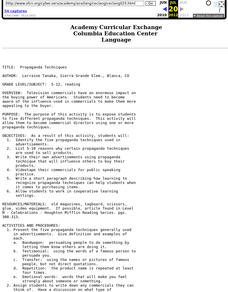

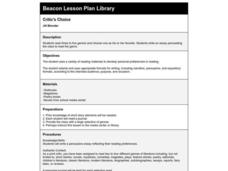

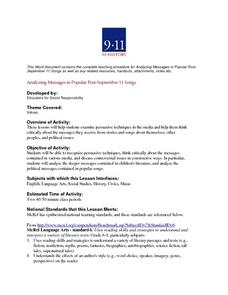
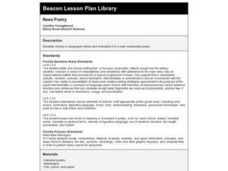




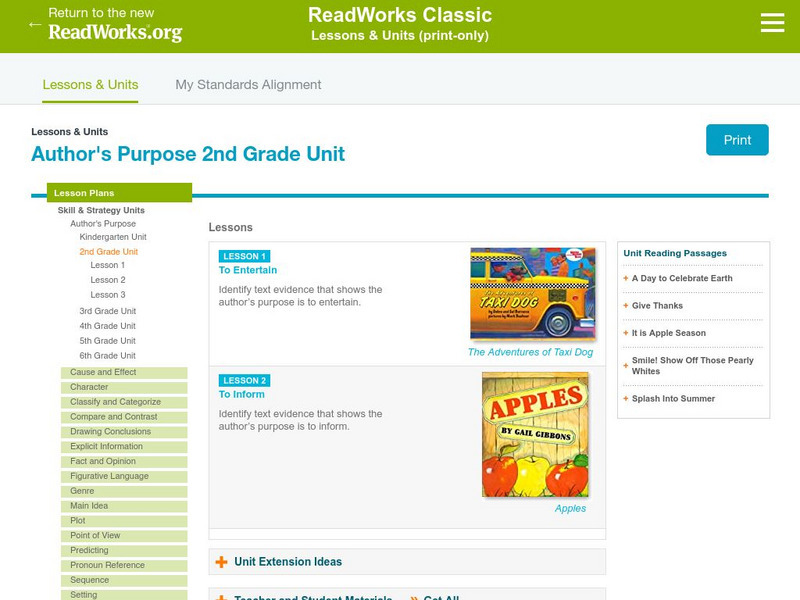


![Florida Center for Reading Research: Text Analysis: What's the Purpose? [Pdf] Lesson Plan Florida Center for Reading Research: Text Analysis: What's the Purpose? [Pdf] Lesson Plan](https://content.lessonplanet.com/knovation/original/509089-64868ece89f3525d24d67087419c1262.jpg?1661786990)